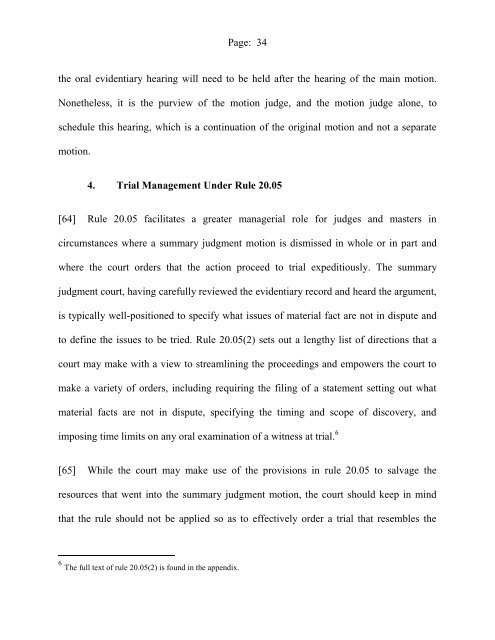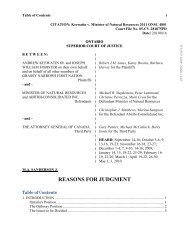COURT OF APPEAL FOR ONTARIO
COURT OF APPEAL FOR ONTARIO
COURT OF APPEAL FOR ONTARIO
You also want an ePaper? Increase the reach of your titles
YUMPU automatically turns print PDFs into web optimized ePapers that Google loves.
Page: 34<br />
the oral evidentiary hearing will need to be held after the hearing of the main motion.<br />
Nonetheless, it is the purview of the motion judge, and the motion judge alone, to<br />
schedule this hearing, which is a continuation of the original motion and not a separate<br />
motion.<br />
4. Trial Management Under Rule 20.05<br />
[64] Rule 20.05 facilitates a greater managerial role for judges and masters in<br />
circumstances where a summary judgment motion is dismissed in whole or in part and<br />
where the court orders that the action proceed to trial expeditiously. The summary<br />
judgment court, having carefully reviewed the evidentiary record and heard the argument,<br />
is typically well-positioned to specify what issues of material fact are not in dispute and<br />
to define the issues to be tried. Rule 20.05(2) sets out a lengthy list of directions that a<br />
court may make with a view to streamlining the proceedings and empowers the court to<br />
make a variety of orders, including requiring the filing of a statement setting out what<br />
material facts are not in dispute, specifying the timing and scope of discovery, and<br />
imposing time limits on any oral examination of a witness at trial. 6<br />
[65] While the court may make use of the provisions in rule 20.05 to salvage the<br />
resources that went into the summary judgment motion, the court should keep in mind<br />
that the rule should not be applied so as to effectively order a trial that resembles the<br />
6 The full text of rule 20.05(2) is found in the appendix.
















